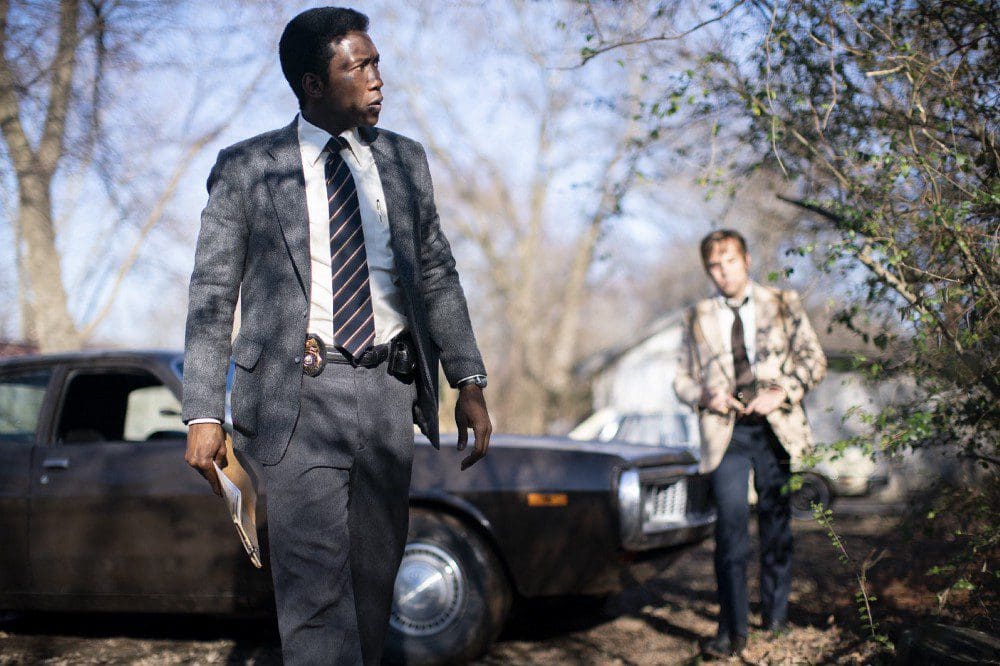
Telling a story across three different timelines is certainly an impressive feat of writing. And while True Detective had previously stumbled while trying to craft needlessly complicated mysteries, its third season has managed to keep things interesting and appropriately mysterious. In its fifth week, we’re starting to get little morsels of answers, hints of broader conspiracies at work, and the finish line is in sight. But… can we speed things up a bit? Because the three timelines become tiring when we already know how one of them will end up.
Yes, a large bulk of this episode was spent in the season’s earliest timeline, as Wayne and Roland deal with the fallout of a fight between the bigoted residents of the town and Brett Woodard, the Native American man who is accused of kidnapping and murdering the Purcell children. We, of course, know from the ’90s and modern timelines that Woodard was accused of these crimes, and that more evidence suggests he didn’t do it, so it’s a bit tiring to have so much of this episode devoted to exploring those facts. It all reaches the same conclusion: there is more to this case than meets the eye. Which, well, is obvious… we wouldn’t be here otherwise.
That being said, the ’90s-set subplot was genuinely compelling and even downright chilling at points. Mahershala Ali and Carmen Ejogo are doing such wonderful things with their characters, supplying little details and character quirks that may not be there on the page. It’s fantastic work. Scoot McNairy also impresses this week, after some inconsistent moments in the previous episodes. Playing a grieving father is a tough part, and McNairy really swung for the fences, crafting a character that is over-the-top and barely resembles a real person. But, this week, he finds a human core to his character, and kills a largely wordless scene near the end.
Speaking of that wordless moment: it’s one of the season’s best reveals, adding more questions but also pushing the mystery in a bold new direction that makes sense. True Detective has always had a bad habit of working slowly towards obvious, or anti-climatic reveals. This one was not the most surprising twist, but it was effective and hair-raising. Similarly, one bizarre clue in the modern timeline was deeply unsettling, and played perfectly by Ali.
It’s also worth noting that, yet again, Pizzolatto seems intent on flirting with more complex themes than he’s used to. The vaguely existential tone of Season 1 reeked of a Philosophy 101 classroom. This time around, he’s trying to explore real issues, including police brutality, race relations, and the media’s sensationalist approach to murder. Is he the best person to talk about these issues? Probably not, and True Detective breaks no new ground in those territories. But he really seems to be making an effort, and that’s a step up from previous years.
The more interesting subtext, however, is the running meta-critique of the mystery subgenre. One brilliant scene, for example, finds Wayne interviewing a former suspect who he teased with threats of prison rape. The suspect calls him out for his problematic behavior, and highlights that what Wayne viewed as normal police behavior had serious consequences on this suspect’s mental health. Maybe I’m reading too far into the moment, but it felt like a smart way of exploring some problematic cliches.
With three weeks left to go, I’d like to see True Detective move further along its story. Things are still interesting, but the show works so much better when it’s providing answers as opposed to asking questions or, worst of all, wallowing in its own self-seriousness. There is so much right about this show: great performers, impeccable production design, genuinely chilling direction. It just has to keep going forward.
Overall rating: 7 out of 10.

